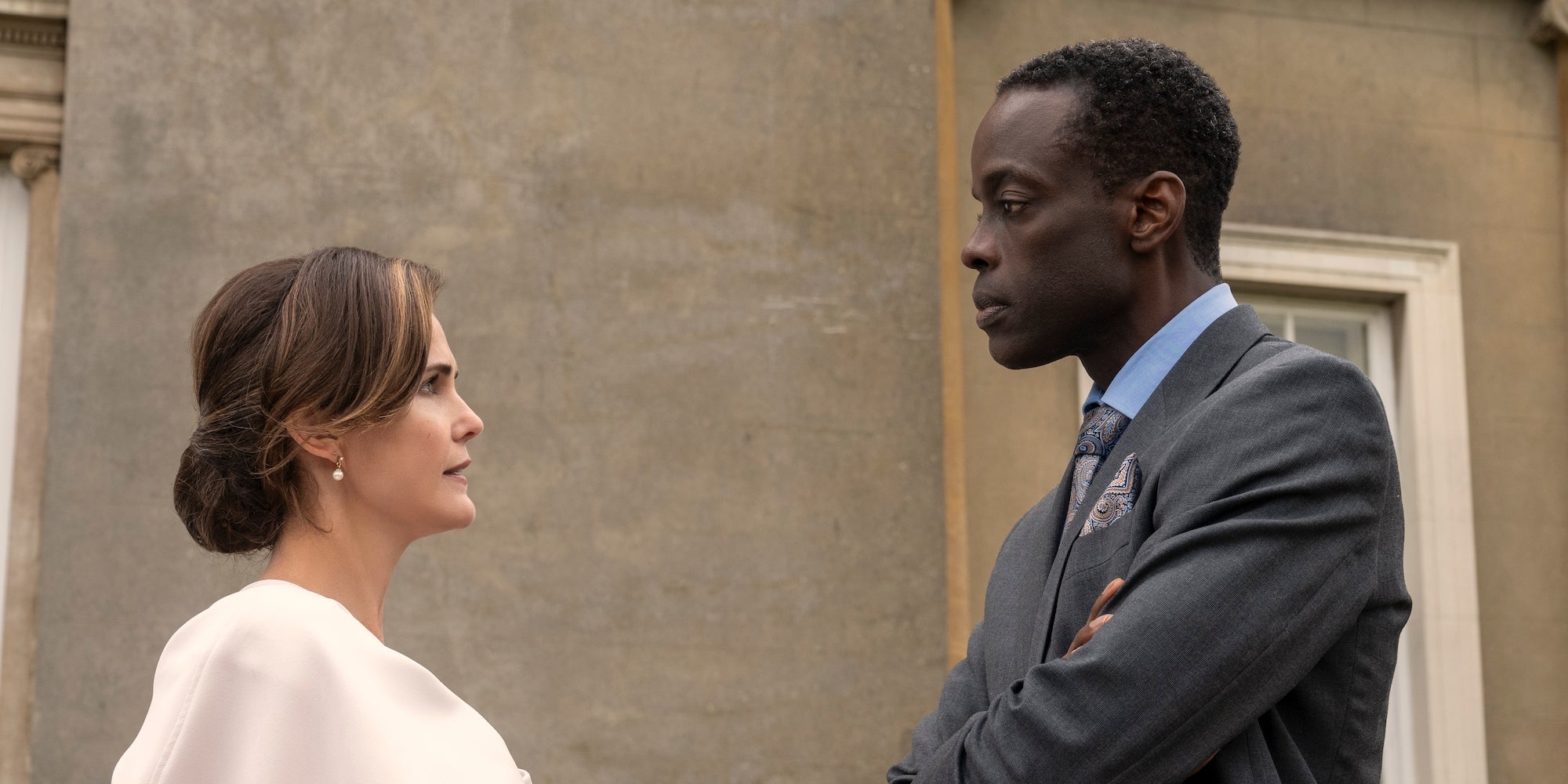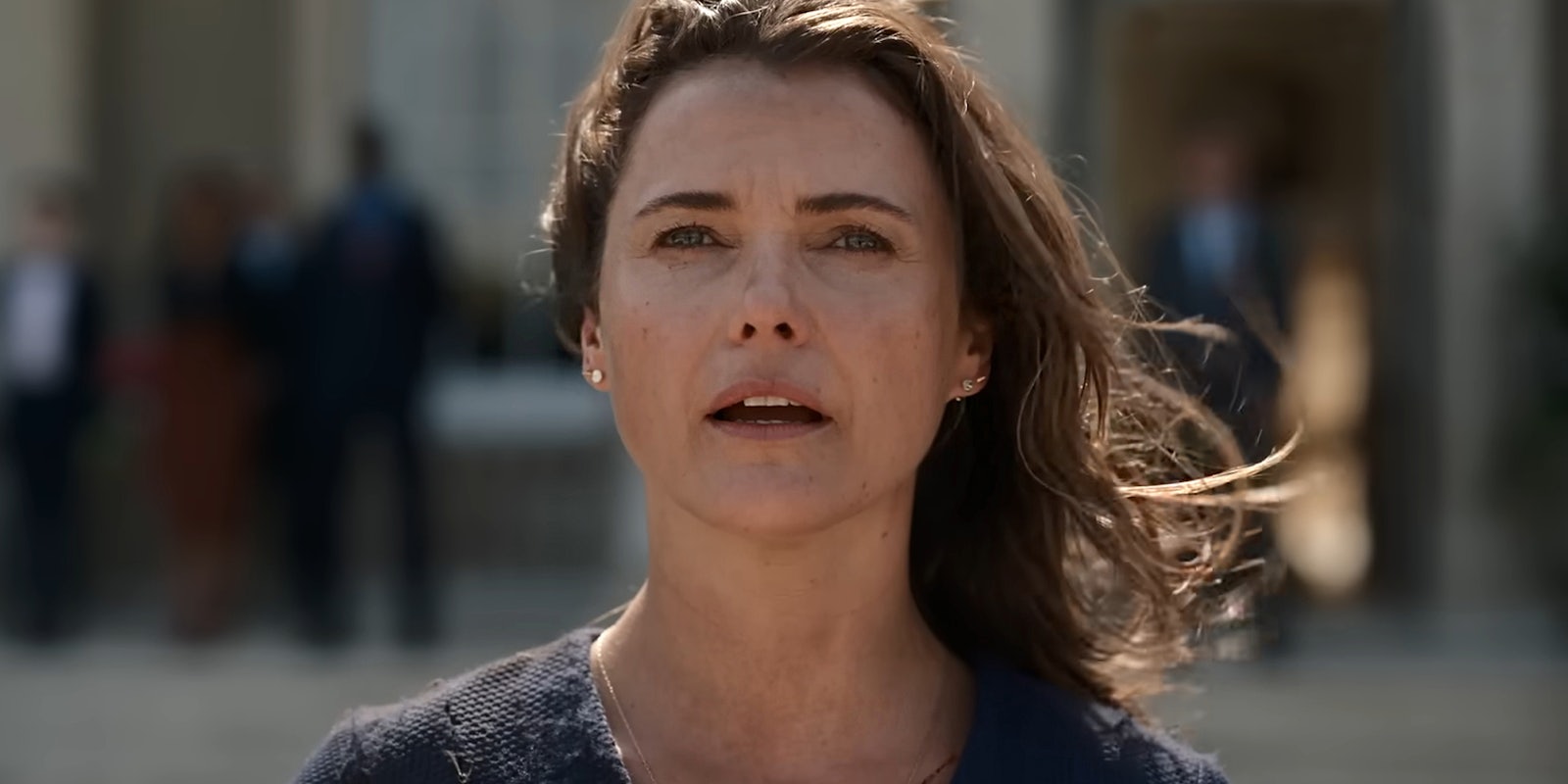The through-line between The West Wing and Netflix‘s The Diplomat is startlingly clear, shaped by showrunner Debora Cahn, a West Wing alum. Appealing to a similar audience of political drama fans, we’re offered Sorkinesque dialogue and narrative tics, with a female lead whose dazzling competence is humanized by her unpolished demeanor. (Is there a scene where she delivers a super-smart monologue to the president while accidentally covered in mud? Oh yes there is.)
Above all though, The Diplomat shares The West Wing’s delusionally rose-tinted view of American politics. It’s cozy viewing for a liberal NPR audience, creating a faux-serious fantasy where government officials can be aspirational heroes.
Set in England, the show stars Keri Russell as career diplomat Kate Wyler, a Middle East expert who unexpectedly becomes ambassador to the U.K. Conveniently, this overseas setting means we can have a “political” story that avoids any contentious issues on American soil, like abortion, gun control, or the rise of white nationalism.
Instead, The Diplomat focuses on America’s relationship with the U.K., as Kate tries to defuse a military conflict with Iran. She wants to avoid a repeat of the Iraq War, acknowledging her country’s guilt even as the show heroizes her diplomatic acumen. We’re invited to see her as the positive face of American interventionism, learning from the bad stuff perpetrated by other people in the past. (Never mind that Kate is very possibly a Bush-era appointee, at one point namechecking Colin Powell.)
As Roxana Hadadi pointed out in Vulture, The Diplomat uses the offscreen suffering of brown people to add weight to Kate Wyler’s girlboss narrative. She wants to protect Iran from unwarranted attacks. She’s alarmed by an Islamophobic hate crime in London. She argues that her time would be better spent helping Afghan women escape violence, not posing for a PR photo shoot in Vogue. (Later, the show clarifies that this photoshoot was a sound political decision because it helps her stay in power.)
Since these examples exist as narrative devices rather than fleshed-out characters, they add a distinct air of white saviorism to Kate’s role. The central conflict may hinge on the Persian Gulf, but the onscreen action is all about Kate outsmarting diplomats in England; a classic A-plot/B-plot structure of a woman trying to prove herself in the workplace while navigating her messy love life at home.
It feels telling that back in her West Wing days, Debora Cahn wrote one of the show’s most notoriously centrist episodes, “The Supremes.”

Foreshadowing the real-world controversy around choosing Antonin Scalia’s successor, this episode covered the nomination of a supreme court justice. Faced with a choice between a palatably moderate judge or a progressive who will surely be rejected by the GOP, the main characters come up with an ingenious solution: Persuade another justice to retire, leaving two spots open on the court. This allows them to nominate a progressive and a conservative at the same time, maintaining balance and fostering “healthy debate.” Despite numerous references to the sexism, racism, and homophobia of the right-wing nominee, this is presented as a triumph for the show’s liberal heroes.
This mindset—a fantasy about fairness rather than a real engagement with human behavior—is echoed by The Diplomat‘s view of international relations. And it serves a very similar function to copaganda TV.
The most insidious impact of crime TV is the way it presents police officers as likable (Brooklyn Nine-Nine) and competent (literally every crime procedural). Crime shows take place in a reassuring alternate universe where cops diligently and cleverly solve violent crimes, contrasting with the reality of corruption, brutality, racism, and ineptitude.
The Diplomat performs the same kind of reputation management for the U.S. government. The tone is a little spikier than the optimistic schmaltz of The West Wing, with characters regularly dropping F-bombs to remind us it’s an adult show. Post-Trump (and for the UK characters, post-Boris Johnson), The Diplomat also has a more cynical view of its political leaders. The show’s president, for instance, is a fairly obvious Biden analogue—an elderly man who isn’t notably smart or impressive, and who is carefully managed by his aides.
Yet the story is still structured around a wish-fulfillment fantasy of political competence, rooted here in atoning for America’s crimes in the Middle East. Kate Wyler is presented as the moral face of international politics, sternly pushing back against hasty decision-making and war-hungry antagonists like the British Prime Minister (an amusingly typecast Rory Kinnear).
The Diplomat’s sexy marital subplots and espionage cliffhangers make it clear that this isn’t a hard-hitting drama. But it’s not meant to be total fluff either. We’re meant to take Kate seriously—as a moral figure, as a diplomatic strategist, and as a potential solution to the implied unseriousness of the current president. Like most political TV from the past few years though, this story only functions if we operate in a state of total denial.
As someone who lives in the U.K. and works for an American media outlet, this show offers a morbidly fascinating crossover between how this denial functions on both sides of the Atlantic. In the U.K., the news media and pop culture are united in pretending that the country isn’t collapsing. If The Diplomat’s British characters even vaguely resembled reality, 90% of them would be comically corrupt, inbred, and ignorant of how to do their own jobs.
Instead of solving problems that feel vaguely rooted in our own post-Trump, post-Brexit reality, The Diplomat could literally take place in the same timeline as the West Wing. In the 17 years between the two shows, we can infer that the seats of power were continually occupied by well-meaning liberals. American society remains blissfully uninterrupted by economic chaos, school shootings, or far-right terrorism.
I understand the appeal, but it’s wild how many shows essentially follow the same playbook of denial.
CBS’s legal drama The Good Fight is the only example I’ve seen that truly taps into the violence and instability of the past few years. Set in a majority-Black law firm, it offered ripped-from-the-headlines political drama in tones of increasingly delirious absurdity, portraying a state of nationwide breakdown through Trump’s election and the Covid-19 pandemic. The Diplomat feels like it was beamed in from an entirely different universe.



